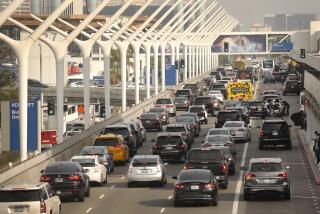Airfares may be ‘bargains,’ but extra fees have soared
- Share via
Domestic airfares across the nation increased nearly 5% in the first three months of 2010 from the same period in 2009, and yet the trade group that represents the nation’s airlines calls the numbers good news for passengers.
The latest airline statistics were released last week by the U.S. Department of Transportation.
The Air Transport Assn. points out that, when adjusted for inflation, the average $328 round-trip fare is 25% lower than in the first quarter of 1999, which was the highest first quarter since the Transportation Department began to keep track of airfares in 1995.
“Travelers certainly appreciate a bargain, and today’s airline customers are getting just that, a bargain,” Air Transport Assn. President James May said in a statement last week.
The group also notes that compared with the pre-recession levels of 2008, fares have grown only 0.4%.
But what the trade group left out of its statement is any mention of the many fees that airlines have begun to charge passengers over the last two years to check bags, change reservations and buy snacks, pillows and blankets. Many of these extras were provided to passengers free of charge in 1999.
These fees generated more than $7.8 billion for the nation’s top 10 airlines in 2009, according to the Transportation Department. Of the 32 air carriers ranked by the percentage of total revenues generated by fees, Spirit Airlines was the highest, at 21%.
David Castelveter, a spokesman for the Air Transport Assn., defended airlines that charge such fees. “The growth of ancillary fees,” he said, “is what has allowed the base fare to remain low.”
He added: “If you don’t check a bag, you don’t pay the checked-bag fee and you still benefit from the low fare.”
• Plane tickets at Burbank, Long Beach are among the cheapest
The government’s latest financial statistics for airlines offered some good news for Southern Californians.
Bob Hope Airport in Burbank and Long Beach Airport were among the nation’s five airports with lowest average airfares for the first three months of 2010.
The average fares may be lower at the Burbank and Long Beach airports, aviation experts say, because both are served heavily by low-fare airlines such as Southwest Airlines and JetBlue Airways, flying primarily short-haul routes.
The average round-trip domestic fare was $208 at Long Beach Airport and $241 at Bob Hope Airport.
The lowest fares in the nation were offered at the airport in Atlantic City, N.J., where the average round-trip ticket cost $188.
The highest average fares were charged at the airports in Huntsville, Ala. ($500), Charleston, S.C. ($443) and Knoxville, Tenn. ($441), according to the Transportation Department.
• Passengers have ideas to improve flying
Passenger rights groups cheered last year when the Transportation Department adopted fines for airlines that leave passengers stranded on delayed flights for more than three hours. The penalties took effect April 29.
But according to a poll by the online travel booking site Airfarewatchdog.com airline passengers have no shortage of ideas to continue improving the services offered by airlines.
According to the poll of more than 2,100 fliers:
— 56% said the airlines should book you on another carrier at no additional cost if your original flight is canceled or delayed;
— 25% said airlines should put you on another airline at no additional cost if the air carrier eliminates a route after you buy a ticket on the canceled route;
— 14% said the airlines should refund the baggage-check fee if your luggage is lost or delayed;
— 7% said all refunds should be paid within 30 days.
More to Read
Sign up for The Wild
We’ll help you find the best places to hike, bike and run, as well as the perfect silent spots for meditation and yoga.
You may occasionally receive promotional content from the Los Angeles Times.






